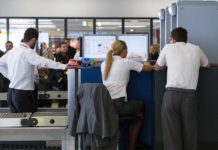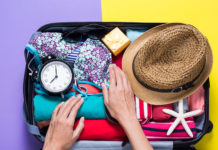United Airlines CEO Oscar Munoz has heard the complaints from air travelers, and he truly regrets the suffering they endure.
“It’s become so stressful, from when you leave, wherever you live, to get into traffic, to find a parking spot, to get through security,” he told ABC News. He also acknowledged that seating is too tight to be shrunk further, and that his airline’s Wi-Fi is unsatisfactory.
Confronted by unhappy air travelers, Munoz feels, or least feigns, great sympathy. I, by contrast, find myself entirely unmoved by their grievances. Perfect bliss is a rare if not impossible attainment in this world. But for passengers on major carriers to gripe about what they have to put up with is like New Englanders complaining about the Red Sox.
I fly something on the order of a couple of dozen times a year, which means I’ve gotten to experience modern commercial aviation at its least enjoyable. Postponed and canceled flights have forced me to scrub plans, miss important events, rent cars and spend the night in airports. I’ve sat next to passengers with sharp elbows, loud voices, bare feet and incontinent infants.
Like any air traveler, I often feel frustrated by endless delays, cramped accommodations and general helplessness. When it all starts to ruin my day, though, I can usually restore my equilibrium by remembering a few important things:
I’m warm, dry, safe and fed, with ready access to caffeine and alcohol. I’m able to visit any decent-sized city in America in a matter of hours, and anywhere in the world in a few more hours. I can zoom across huge distances, for a fare that is not onerous, and return at my convenience.
Some of our ancestors came across a perilous ocean on rickety ships, some of them in steerage and some of them in chains, with the added attractions of rats, scurvy and stale hardtack. Our forebears crossed the continent in covered wagons, on horseback, in canoes or on poorly shod foot. Many of them risked their lives; all of them sacrificed their comforts, if they had any.
Were Lewis and Clark outraged when bad weather forced adjustments in their schedule? Did African Americans fleeing slavery worry about spotty Wi-Fi service? Did the pioneers who migrated westward complain about the amount of legroom in their open-air, wooden-wheeled, horse-drawn buckboards?
When my father was attending college at the University of South Carolina in the 1940s, he didn’t fly home to see his family in West Texas. He spent long days hitchhiking — 1,100 miles each way. Today, thanks to the airlines, I could have breakfast in Chicago, lunch in South Carolina and dinner in West Texas.
If air travel has become unbearable, why are the airports and flights packed with people? In the past 30 years, the number of passengers flying in the United States has nearly doubled. That’s why the parking lots are so full, the security lines are so long, the lounges are so crowded, and the seat next to you is always occupied.
A major reason for the surge is that flying is much cheaper than it used to be. As Robert Poole noted in Reason magazine last year, the average domestic airfare today is $344. In 1979, it was the equivalent of $616 in today’s dollars.
Tight seating, baggage fees and minimal amenities are not an airline plot to make you miserable. They’re an airline plot to keep fares low, because most travelers are loath to pay more for a cushier trip. They want to get where they’re going as inexpensively as they can.
Let’s not forget the matter of safety. There hasn’t been a fatal U.S. airline crash in more than a decade. If you survive the drive to the airport, your biggest risk is choking to death on a Starbucks scone.
Big carriers do make mistakes. American Airlines apologized for removing a woman and her child because they had a rare skin condition. United gained infamy for having a passenger dragged off an overbooked flight. Delta apologized to a man whose seat was smeared with dog feces.
Human error, however, is an inherent feature of every facet of life, not a trait distinctive to airlines. What most people put up with when they fly is not hardship but inconvenience. Such is the luxury of modern life that we sometimes forget the difference.






























